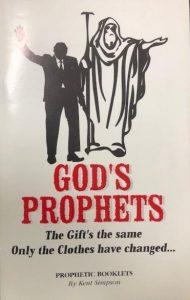Spiritual Word of Wisdom
Holy Spirit & Spiritual Gifts: From Prisoner to Prime Minister
Joseph, son of Patriarch Jacob/Israel, was the first person definitively mentioned in the Bible as having the Spirit of God in him. Though his spiritual gifts were emerging in his youth, they were not fully realized until God had placed him in many unique circumstances, which allowed him to demonstrate and develop his gifts, so he would be ready for the grand plan God had for his life.
Joseph was the son of “Rachel, who was shapely and beautiful and Jacob loved Rachel” (ref. Genesis 29:17-18). Even though Jacob had ten other sons, it was only after Joseph’s birth, that Jacob insisted on moving the whole family from where they grew up, back to his homeland in Canaan, so that Rachel’s son, Joseph, had the opportunity to collect his portion of inheritance (ref. Genesis 30:25-31-18). When Jacob came across his blood-thirsty brother Esau, with 400 men, Jacob strategically placed Joseph and Rachel towards the safety of the back of the caravan, with the rest of the family upfront, just in case violence erupted (Genesis 33:1-2, 7), so his favored son and wife had a greater chance of escape. Jacob was open about his favoritism towards Joseph and the presentation of his beloved son with an ornate coat (Genesis 37:3) cemented his brothers’ jealousy and hatred towards Joseph because “his brothers saw that their father loved him more than any of them, [and] they hated him and could not speak a kind word to him” (Genesis 37:2).
When Joseph began having prophetic dreams and interpreted them to signify that he would be glorified over his family, his brothers and father rebuked him angrily, accusing “Do you intend to reign over us? Will you actually rule us? What is this dream you had? Will your mother and I and your brothers actually come and bow down to the ground before you?” Despite demonstrating a rare gift, they hated him all the more because of his dream and what he had said and were jealous of him (ref. 37:3-10).
Joseph first demonstrated his other gifts of organization and management as a young man of seventeen, when he was tending his father’s flocks. Joseph’s brothers were not thoughtful in how they kept the animals, carelessly moving from one region to another, without informing their father. Their mismanagement was recognized by their father Jacob, who sent Joseph, the youngest of his sons, to check in on the rest of the older brothers and the flocks, fearing something was amiss, since Joseph had previously brought a “bad report” possibly concerning how they conducted their shepherd duties. These critiques and possible suggestions on how to do their job better, especially coming from someone so young and comparably inexperienced, infuriated Joseph’s brothers and filled them with a murderous rage.
This hatred for Joseph led to his brothers initially planning on killing him, before deciding that selling him into slavery would at least benefit them with some silver.
Joseph was brought to Egypt and sold to Potiphar, the Captain of Pharaoh’s Guard, who saw that “the Lord was with Joseph and that the Lord gave him success in everything he did, so Potiphar put him in charge of his household and of all that he owned [and] the Lord blessed…everything Potiphar had, both in the house and in the field. So Potiphar left everything he had in Joseph’s care.” When Joseph is approached by Potiphar’s adulterous wife, he responds that “With me in charge, my master does not concern himself with anything in the house; everything he owns he has entrusted to my care. No one is greater in this house than I am” (ref. Genesis 39:1-9).
After being falsely accused by Potiphar’s wife, Joseph was thrown into prison where “the Lord was with him; and granted Joseph kindness and favor in the eyes of the prison warden [who] put Joseph in charge of all those held in the prison, and he was made responsible for all that was done there…and all that he did, the Lord made it to prosper” (ref. Genesis 39:10-23).
While Joseph was in prison, he was put in charge of two of the Pharaoh’s officials, the Chief Cup-bearer and the Chief Baker, who both had a dream the same night and were dejected when there was no one who could interpret their dreams. When they shared their concerns with Joseph, he replied “Do not interpretations belong to God? Please tell them to me” before explaining that the Chief Cup-bearer would be restored to his position in three days, while the Chief Baker would be executed in three days, on Pharaoh’s birthday.
Two years later, Pharaoh had disturbing dreams two nights in a row and told the reinstated Chief Cup-bearer how he had “sent for all the magicians and wise men of Egypt, but no one could interpret his dreams” (Genesis 41:8). The Chief Butler remembered Jacob who had interpreted his own dream, while in prison, and “Pharaoh sent for Joseph [explaining that he] had a dream, and no one [could] interpret it, but [Pharaoh had] heard that when [Joseph] heard a dream, [he] could interpret it”. Joseph correct Pharaoh, “I cannot do it, but God will give Pharaoh the answer he desires”.
After Joseph interpreted Pharaoh’s dreams, which predicted seven years of good harvest before seven years of intense famine, Joseph shrewdly suggests that Pharaoh “look for a discerning and wise man and put him charge of the land of Egypt, appoint commissioners over the land to take a fifth of the harvest of Egypt during the seven years of abundance, collecting all the food of these good years that are coming and store up the grain under the authority of Pharaoh, to be kept in cities for food. This food should be held in reserve for the country, to be used during the seven years of famine that will come upon Egypt, so that the country may not be ruined by famine”.
Pharaoh recognized Joseph as “being filled with the Spirit of God [and] since God made all this known to [him], there [was] no one so discerning and wise as [him], so Pharaoh put [Joseph] in charge of the whole land of Egypt,” (Genesis 41:37-41). It was the first day, of the first month, the same day Christ would later start His Ministry, that Joseph is elevated to Prime Minister over Egypt.
Joseph first began managing his father’s flocks, before taking over Potiphar’s household, then the affairs of the prison, and finally, the whole administrative system of Egypt. Likewise, Joseph started by first interpreting his own dreams, then those of Pharaoh’s officials, before finally explaining Pharaoh’s prophet dream, having developed so much in his gifting, that he recognized that “the reason the dream was given to Pharaoh in two forms is that the matter [had] been firmly decided by God, and God [would] do it soon” (Genesis 41:32). But Joseph realized that he was successful in his efforts because the Lord made them prosperous, just as his interpretations came from God.
Joseph’s chronicles, which began with tending sheep in the pastures, saw him falsely thrown into prison, and ended with him saving Egypt as Prime Minister, is a reminder that God gives us opportunities through each of our stages in life to not only grow deeper in our trust in Him, but also develop our spiritual gifts and prepare for the next responsibilities and positions He has planned for us.
Prepared by, Kent Simpson, Apostolic Prophet & Eric Sepulveda, PMT Administrator
For more prophetic media groups click here



